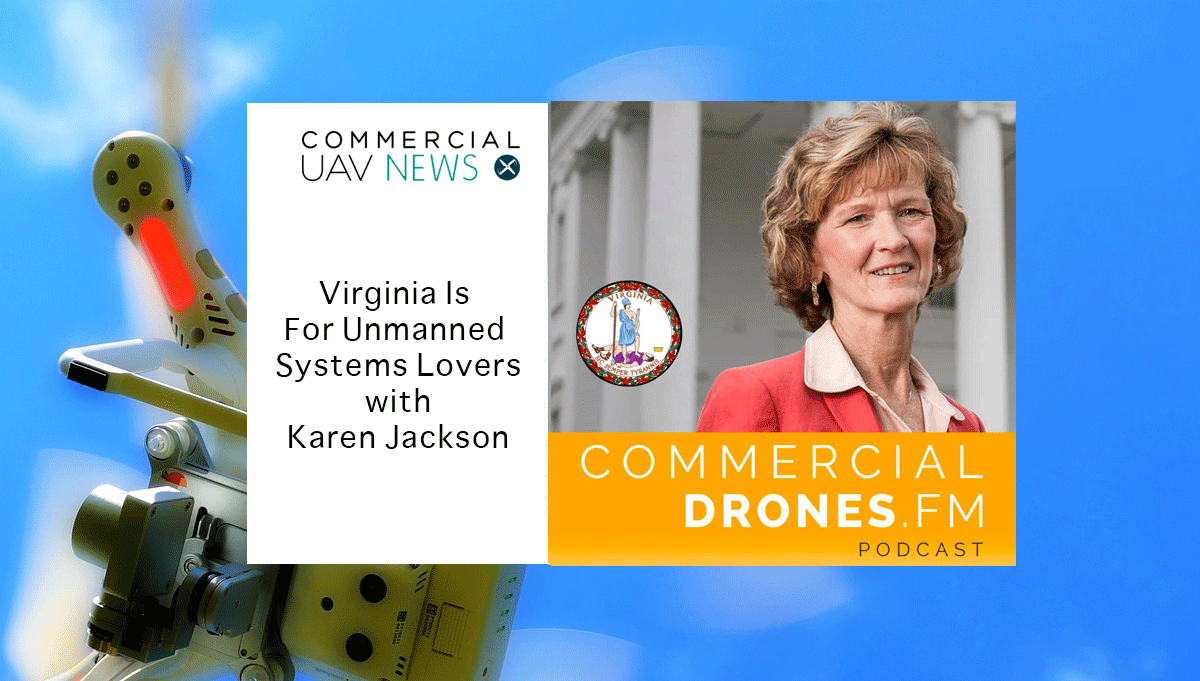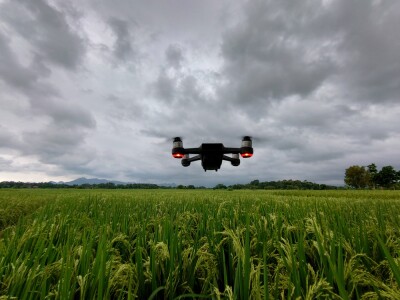As the Secretary of Technology for the Commonwealth of Virginia, Karen Jackson is tasked with advising the Governor on technology matters including innovation, data analytics, telecommunications, cybersecurity, and unmanned systems. She is responsible for developing programs to facilitate innovation, entrepreneurship, technology development, and adoption, all of which has meant she’s taken an especially long look at the commercial opportunities presented by drones.
On episode #47 of the Commercial Drones FM podcast - Virginia Is For Unmanned Systems Lovers with Karen Jackson - Karen joined host Ian Smith to talk about those responsibilities and opportunities, plus plenty more. Among other topics, the two talk through the dichotomy between state vs. local vs. federal regulation of commercial drone operations.We caught up with Ian to further discuss a few of the things he talked with Karen about, including what it means for the industry to have a place it can test new initiatives and how not considering “what if” situations that drones present might impact everyone. Read through the additional insights before or after listening to the podcast below. You can also listen to the episode on iTunes or GooglePlay. Jeremiah Karpowicz: While it’s great to see Virginia’s new slogan, the establishment of their Center of Excellence feels like an even bigger development for commercial operators. Colorado is another state that has setup their own Center of Excellence, and the initiative strikes me as an ideal way to bridge the gap between drone technology and practical adoption. What are your big takeaways from these sorts of initiatives that are being created by individual states (or commonwealths)?Ian Smith: At the state level, initiatives like this are usually a step in the right direction. However, not every initiative is always successful. As long as there is significant runway for the maintenance and preservation of the initiative in question—with the citizen's best interest in mind—it has a solid chance of success. I'm interested in learning how well initiatives like this last and to see actual figures and metrics that prove their success. Karen talked a little bit about the testing and R&D opportunities that Virginia has to offer. What does it mean for the industry to have a resource like this that will specifically allow them to test out how operations like BVLOS can work?If a company or entity wants to run trials for BVLOS operations then a sanctioned area in which these activities can be vetted is a great asset. Having specific zones that are dedicated to operations such as these is a great boon for drone businesses in proximity and it definitely is more attractive than U.S. companies having to go overseas to find more conducive testing environments (Amazon, I'm looking at you). I love hearing people like Karen talk about drone technology, because she’s focused on what sort of economic opportunities drones represent for them. Do you think this kind of talk is altogether different from the “billions and billions” of dollars hype that is still floating around though? It was really great to learn about Karen and Virginia's shared, forward-thinking approach to integrating new technology into their local economy. It's a bit separated from the hype surrounding the industry as a whole in that Karen's views seemed more focused on the immediate benefit of stimulating their regional economy and kickstarting new industries and jobs for the good of Virginia's citizens. I’ve talked with some folks who want to see less federal involvement in the regulation of drones, but it’s hard to imagine that environment not being a patchwork of regulation. What kind of issues do you foresee we’d be dealing with if we end up with that patchwork of regulation, where it means something different to fly a drone for commercial purposes from state to state, and even from city to city? How would that hinder adoption? I'm a pretty big fan of a nationwide, federal framework for drone regulation but there are always pluses and minuses in every scenario. A patchwork of regulations across the U.S. (or any nation) would cause unnecessary difficulties to the operation of drones and by a hindrance to adoption. The drone industry is not yet saturated enough to necessitate this type of action. It will stifle advancements and create micro-economies rather than the widespread proliferation that this industry needs to realize its true potential. The point Karen made about “what-if’s” that people don’t consider when trying to enact specific drone regulation was a great one. Ultimately, are the issues we’re having with drone regulation and even the public perception of the technology the result of people not thinking things all the way through?I've been happily vocal about congratulating the FAA for putting some great initial regulatory framework in place with Part 107. I do believe that it was very well thought out and is a solid foundation to build upon. The public, however, is definitely guilty of not thinking things all the way through sometimes. But it's not their fault—I'm a member of the public and suffer from the same honest lack of information in regards to other industries that I'm not a part of. Over time, and as technological advancements continue, both the government and the general public will become more comfortable with drones and that's when the issues of today will cease to exist. The only problem with that is, as an industry, we're impatient—and rightly so.Subscribe
The information you submit will be stored and used to communicate with you about your interest in Commercial UAV News. To understand more about how we use and store information, please refer to our privacy policy.
July 3, 2017
Integrating New Technology Into the Local Economy of Virginia - Commercial Drones FM Podcast Insights















Comments